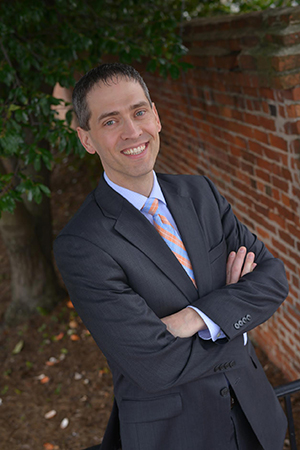 The faculty at Catholic Law is comprised of educators dedicated to teaching, scholarship, and service. They are experts in their fields and critical thinkers about the law—committing to making an impact on their communities and the world.
The faculty at Catholic Law is comprised of educators dedicated to teaching, scholarship, and service. They are experts in their fields and critical thinkers about the law—committing to making an impact on their communities and the world.
For Visiting Associate Professor Jeremy Kidd, the ability to understand how rules and regulations affect those they are created to serve is an important part of being a lawyer. “I’ve seen how important the rules we choose to regulate business are, that they have a much larger impact on people’s lives than we realize[…] I realized I could have a greater impact on the world if I learned and taught those principles to the next generation of world leaders.” Despite early scholarship focused on tort law, Kidd now specializes in corporate law. With a J.D. from the Antonin Scalia Law School at George Mason and Ph.D. in Economics from the John M. Huntsman School of Business at Utah State, he brings to his teaching an understanding of corporate, securities, and commercial law; and how special interests use the various mechanisms of government to achieve their private ends.
While working as a legislative assistant, Kidd’s interest in teaching the next generation was sparked. Kidd regards problem-solving as a crucial skill in creating a good, effective lawyer. “Our clients present us with starting conditions and end goals, and our job as lawyers is to figure out how to get to the goals, avoiding all the possible obstacles in our clients' way. Solving current problems is essential, but even more important is the ability to anticipate future problems and avoid them before they even get there. Adaptability is also essential since very little stays the same, and the best-laid plans rarely survive for very long.”
Kidd believes the need to problem solve is just as critical in the classroom. He shared, “Good students have to problem solve all the time, both for themselves and their classmates. They problem-solve how to best prepare for each class, changing strategies as they go. They problem-solve how to put together a schedule each semester in order to make themselves into the lawyer they envision for the future.”
As a new school year starts, Kidd is excited to teach a new incoming class of future lawyers. For first-year students, he has this advice, “As the world becomes ever more connected, the opportunities for today's law students to specialize increase, so they should think about what areas of law really make them happy, and figure out how to make that area of law profitable for them.”
